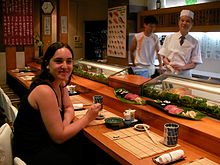Experience gastronomy
The term experience gastronomy is understood to mean gastronomic concepts in which guests are offered not only food, drink and hospitality, but also additional entertainment, for example through a stage performance, animation directly at the table, watching while the food is being prepared, or involving the guests in the preparation of the meal , an unusual interior design that can be coordinated with the food on offer ( theme restaurants ), or through an unusual location ( tower restaurants ).
Experience gastronomy traditionally plays a major role in Southeast Asia, for example in Japan . It is also widespread today in the United States . In the German-speaking area, such concepts have only been found sporadically, for example in the form of dinner shows. As early as the 1920s, however, dance teas were popular, which were not only organized in private settings, but often in tea houses .
Experience gastronomy in the USA
In 1933, the first Tiki-Bar was opened in Los Angeles , a cocktail bar that was furnished in the Tiki style and in which “Polynesian” drinks such as Mai Tai or Zombie are offered.
Another pioneer in themed gastronomy was the American restaurant chain Hard Rock Cafe , whose first branch opened in London in 1971. In terms of international fame, it is only surpassed today by Planet Hollywood , a chain that was created in 1991 with support from Sylvester Stallone , Bruce Willis , Demi Moore and Arnold Schwarzenegger . Today there are numerous other chains of theme restaurants in the USA, including Bob Evans, Cracker Barrel (American country life), Bubba Gump ( Forrest Gump film ), Chuck E. Cheese’s (fair, arcade), Hooters (nightclub- themed ), Johnny Rockets ( Diner ), Longhorn Steakhouse , Texas Roadhouse ( Western ), Medieval Times (European Middle Ages, dinner theater), Outback Steakhouse (Australia) and Rainforest Cafe ( jungle ). The small aquarium chain connects its restaurants with very elaborate aquariums that form an independent visitor attraction. Dick's Last Resort is a small chain of "anti-restaurants" that play with the entertainment value of waiters who deliberately serve their guests in a rude and careless manner.
In the United States, there are also restaurants where guests are entertained at the table, either by the cook ( Hibachi restaurants ) or by a suitably trained waiter. In Max's Opera Cafe in San Francisco, for example, the waiters perform opera arias for their guests. In the New York Ninja , the waiters dressed up as Japanese partisan fighters entertain their guests with magic tricks.
Adventure gastronomy in Germany
Ulrich and Karin Acksel practiced what is probably the first experience gastronomic concept in the GDR in Großräschen from 1965.
Since the 1990s, various providers in Germany have been trying to combine gastronomy and circus or vaudeville, in which the restaurant is a guest in different cities and the guest eats in a tent, where he is entertained between the aisles with acrobatics and performances by clowns. to manufacture. Well-known examples are “Pomp, Duck and Circumstance” by Hans-Peter Wodarz and the “Witzigmann Palazzo” by Eckart Witzigmann .
So-called crime dinners have become widespread in Germany . These are multi-course dinners in which actors engage the guests in an interactive play, usually a kind of detective story .
As early as 1938, the writer Kurt Kluge described adventure gastronomy in this modern sense - at that time, however, as a humorous fiction - in his novel Der Herr Kortüm (1938).
Individual evidence
- ↑ Aquarium. Retrieved April 30, 2016 .
- ↑ Dick's Last Resort. Retrieved April 30, 2016 .
- ↑ Max's Market. Retrieved April 30, 2016 .
- ^ Ninja New York. Retrieved April 30, 2016 .
- ↑ Ulrich Acksel: Schnurren und Schnaken aus der Lausitz (Berlin 2012) pdf
- ↑ New future for cult hotel in Großräschen (Lausitzer Rundschau online April 3, 2019) [1]

